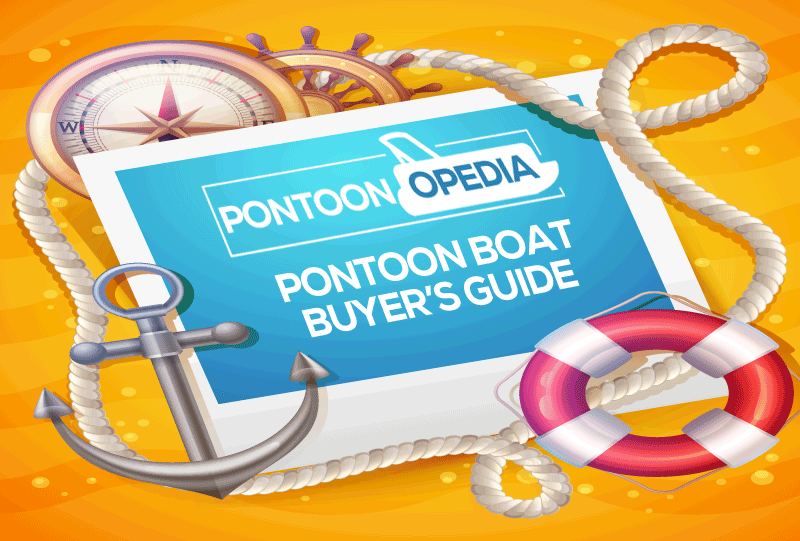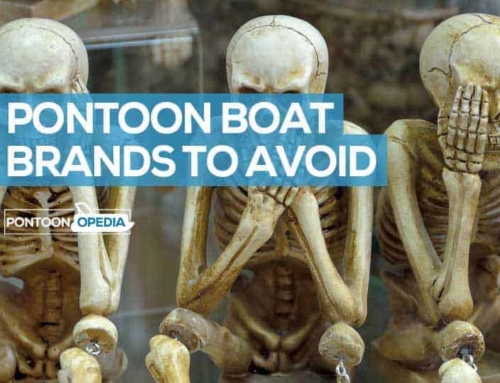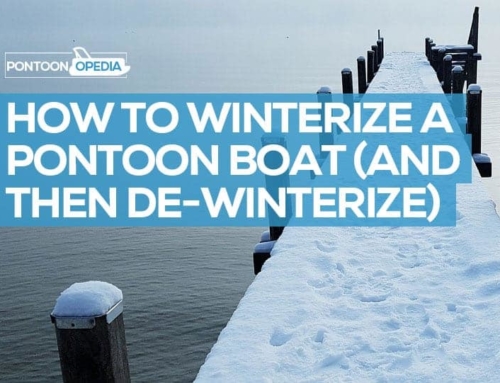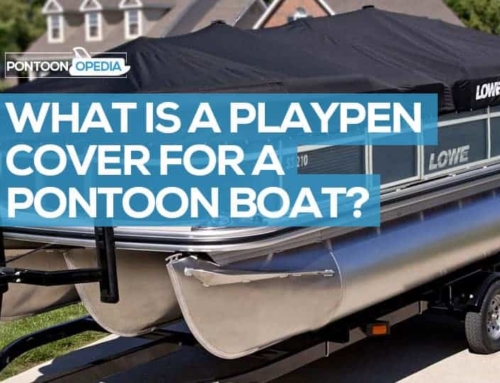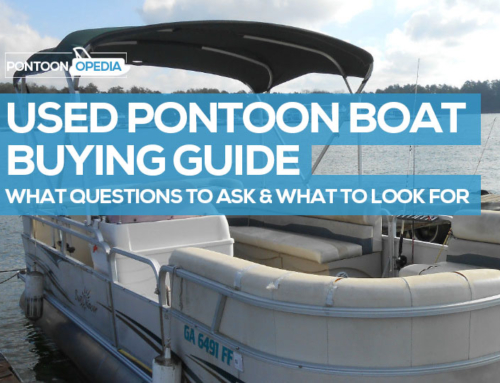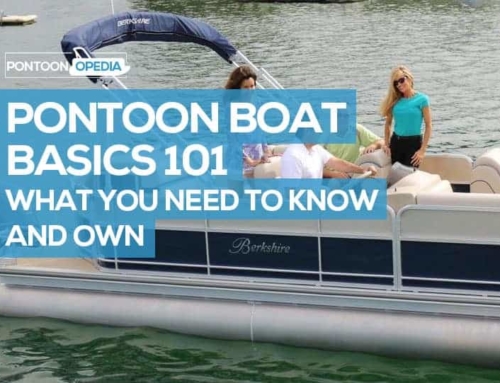When I decided that I wanted to buy my first pontoon boat, I was stunned by the lack of information and advice online for first-time buyers. It took me a good 6 months to do my own research online, as well as at boat shows, and also down by the water before I finally took the plunge.
It was the best decision I have made, but I do wish that there had been a comprehensive online guide that told me everything I needed to know in just one place. It would have saved me a lot of time and research (plus confusion!).
That’s the motivation behind the guide to buying that you are seeing here today, as I wanted to put something together that was simple and easy to understand for first-time buyers of a pontoon boat.
I hope you find it useful, and it’s the first step for you in helping to decide whether or not this is a good choice for you, and what you need to know before you open your wallet regardless of the multitude reasons you could be deciding to buy.
Buying Tips & Advice for Pontoon Boats
+ What to Avoid When Buying a Pontoon Boat
Buying your first pontoon boat is one of the most exciting things you can do. But it’s a process fraught with indecision and massive choices to make, as in most cases, you are going to spending a lot of money so you need to get it right. First time.
I’ve seen plenty of first time pontooners taking home far more boat than they actually needed to buy, purely because they didn’t have the knowledge and experience needed in order to make the best decision to suit them.
I can’t imagine there being anything more soul-destroying than getting your boat onto the water for the first time, and then not having the necessary seamanship skills in order to handle it, or simply having something not fit for the purpose you actually bought it for.
That’s where this pontoon boat buyer’s guide is going to help you, so please do feel free to print it out and study it in detail in your own time. Let’s get straight into it.
Size and Capacity Considerations
Just because you have a large budget, it doesn’t mean you should get the biggest pontoon that you can afford whether that’s in length or width.
Some considerations to take into account with the size when buying, is that yes, a 36 foot boat will be twice as long as an 18 footer, but with that can also come additional expenses you might not have thought about.
The types of aspects you will also need to budget for when opting to buy a bigger pontoon are:
- How much you will be spending on fuel
- How much you will be spending on pontoon boat insurance (see how much)
- How much you will be spending on docking and storage
- How much you will be spending on repairs and maintenance
- How much you will be spending on accessories
- How large your trailer will need to be and the towing capacity of your vehicle
All of the items above will increase substantially, the larger your boat is. Stands to reason, and it’s true.
My advice is to start off with something more modest that will let you and your family learn how to handle and drive a pontoon boat without spending out on what could be a very expensive mistake.
It’s key to remember, that almost everybody who buys their first boat will naturally upgrade and go larger the more experienced that they get. A first-timer should opt for something smaller and manageable that will let them learn about boating and the unique behavior of a pontoon, before progressing onto something bigger in the future.
No matter what size you eventually opt for, one of the most important things to pre-plan will be how you transport it if it’s not going to be left permanently on the water.
You are going to be trailering your pontoon and will need to know how much the boat will be at dry weight, so you know whether or not your trailer can handle it. It’s not just the trailer you will need to consider, as you will also need to check that your vehicle can safely tow the boat from point A to point B.
If you’re not sure how much the pontoon boat that you are going to be buying is going to weigh, then feel free to use this calculator I have developed.
Should You Buy New or Used?
As a first-time pontooner, it might make sense to limit how much money you will have to spend, which naturally will make you explore the used market.
Buying used and second-hand will cut down your costs significantly, but it’s not without it risks. For example, please don’t ever buy a pontoon without knowing how many hours are on the motor. You also should think about the maintenance costs you might experience if buying something that’s older and pre-owned.
But let’s take a quick look at the options you have as a buyer, comparing the pros and cons to either buying a new pontoon, or buying a used pontoon.
Buying a New Pontoon Boat
When you buy from new, it will be from an authorized dealer. They all have direct relationships with the manufacturers, giving you the peace of mind in knowing you have a long-term warranty on your purchase. It will also give you a point of trusted contact to go to for any annual maintenance and repair jobs.
But, did you know, the price you pay the dealer will include a top-up for the actual warranty? It’s not something that you will be getting for free, but it will be worth every penny extra.
It’s a massive advantage, as should anything go wrong and need repairing, you’re going to be covered for the time period expressed in the warranty document. You won’t get that type of cover with a used boat purchase, as in most cases they will be sold to you in an “as seen” condition.
For this reason alone, I always recommend that a first-timer should buy a brand-new boat direct from an authorized dealer as their first ever purchase.
Pros to Buying New
- You will get a manufacturer warranty
- You should be able to apply for boat finance
- You will get support from the dealer in how to operate your pontoon
- You get to choose what options, accessories, trims, and color you want
- You might also get a trailer included in the purchase
- You should also be given all the safety equipment you need
Handy Hint: If you want to know what safety equipment I advise pontoon boat owners buy, then please click here for a checklist of safety gear.
Cons to Buying New
- You will have to pay a LOT MORE for your boat
- Your new pontoon will depreciate over the first 12 months of ownership
- You might have to wait a long time to receive you boat if it’s not on the lot
- You will be encouraged to pay for additional options by the dealer
Handy Hint: I have written a guide on how much new pontoon boats will depreciate by. To find out what you could expect, read my depreciation notes.
In the pros and cons above I mentioned trailers.
When you buy from new, most dealers will throw a trailer in as part of the deal that is the perfect size and spec for your new pontoon. This is going to save you a lot of hassle compared to having to track down the ideal sized trailer if you were buying a used boat.
In the majority of cases, when buying a used pontoon, the existing owner might want to keep their trailer, and will probably be transferring all of their safety gear over to their new boat if they are doing an upgrade.
But what if you aren’t a first-time buyer?
This is where my advice in the pontoon boat buying guide does differ somewhat, as experienced pontooners will have the relevant know-how in the used market.
For example, if you are already familiar with how pontoon boats behave, the mechanics, and accessories needed, then this experience should mean you can spot a great deal in the used market and be able to pick up something that’s going to suit you and your budget.
In this scenario where experience counts for so much, it’s more than likely that you could buy a used boat and have it on the water on the same day plus save money at the same time.
Pros to Buying Used
- You will spend less money on an equivalent spec and sized boat
- You might be able to get onto the water immediately
- Your used boat won’t depreciate in value as much as a new model
- The seller could throw in the essential accessories as part of the deal
Cons to Buying Used
- You might find it hard to finance the purchase at a low interest rate
- You probably won’t get a warranty with the boat
- You will have higher maintenance costs and possible repairs
- Your cost of repairs could eventually be the same total if you had bought new
Advice on Buying a Used Pontoon Boat
Just because you are buying a used pontoon boat, it doesn’t mean you won’t be buying from a reputable dealer. Used boat sales are sourced from two distinct types of seller:
- Dealers and brokerages
- Private “driveway” sales
No matter which source you buy from, you will have the advantage in being able to barter not just on the actual cost, but also on what the boat comes with.
For example, many sellers, be they private or dealers, will throw in expensive accessories as part of the deal which you would have to pay top dollar for if buying brand new.
And even if your chosen used pontoon is battle weary with some dings, scrapes, and missing parts, a lof of the fun and money saving can come from doing the work and upgrades yourself. This is what I have done, and it’s given me hours of fun, experience, and satisfaction.
There are extensive guides on the Pontoonopedia website on how to do virtually anything to your boat, from where to place your sub-woofer, to how to clean up algae off the tubes. You can use the search function on the website, or dip straight in to the recommended gear section if you want to find out more.
Ultimately though, the price advantages to buying a used pontoon can look very appealing at first glance. But please, please, please do your due diligence.
No matter how well the previous owner has looked after the boat, there are going to be hours on the motor, gauges, bilge pump, and more – all of which could lead to expensive repairs and upgrades in the very near future.
Those alone could off-set the financial advantages to buying a used pontoon over a new one from a dealer.
What Price Should You Pay?
And here is the crux of so many decisions when it comes to buying your first ever pontoon.
The money. It’s so often, all about the money.

I don’t advise you say this! Instead, do your research…
The first thing to understand is that whilst the RRP on pontoons are set by manufacturers, the dealers are entirely free to price up their boats as they see fit. So just because you see one price at one dealer, it doesn’t mean you won’t get it cheaper elsewhere.
Negotiation can play a massive part in buying your pontoon, so don’t be afraid to shop around, get quotes, and then take those back to your chosen dealer to see what deal they can strike for you. You would be surprised at what a difference in price you can get just by doing a little research and comparison checking.
Handy Hint: Did you know that some pontoon boats are more popular depending on the region you live in? It’s worth considering the re-sale value of your boat if you are going to sell it on locally in the future.
My guide to your approach to pricing would be (if buying new or used from a dealer):
- Research your boat online, and print off specs and deals from around the country
- Take those quotes to your local dealer and ask for a price beat or match
- If buying from outside of your locality, consider transport costs and re-sale values
- And finally, always barter on price, even if it doesn’t come naturally to you
If you are buying used, then always insist on seeing how many hours are on the boat’s motor. If the seller can’t provide this information, then walk away from the deal.
How Do You Know if it’s a Good Pontoon?
Other than price, the biggest factor for first-time buyers is whether or not the pontoon boat is of good quality or not.
Whilst most of the major pontoon manufacturers in the United States have exceptionally high standards (click here for the top 10 list), there can be subtle differences in quality between a few of them.

Just a few of the big names that you can trust in the pontoon industry.
NMMA Certification
The biggest tip I can give you in this pontoon buyer’s guide is to check for NMMA certification. If the pontoon you are buying carries a National Marine Manufacturer’s Association sticker then you know it’s been designed and built to the national quality guidelines and standards.
The top 10 manufacturers I referred to earlier are (in no particular order, just by alphabet):
- Avalon
- Bennington
- Bentley
- Crest
- Godfrey
- Harris
- Manitou
- Premier Pontoons
- Sweetwater
- Sylvan
All of the names listed above are the standard-bearers when it comes to quality pontoon boats. They are NMMA certified meaning they have had factory inspections, and the materials comply to US Coast Guard and the American Yacht and Boat Council specifications. All of them are designed and built in the United States.
Test Driving
Aside from that, you need to see the boat out on the water. If it’s a used pontoon, this should not present any problems and dealers will typically be able to give you a test drive, although there could be a waiting time to do so.
You wouldn’t buy a car without first taking it for a test on the road, and the exact same applies when buying a new boat.
Handy Hint: Click here to learn how to drive a pontoon boat for the first time.
Walk Around Checks
Before you even do that though, the first thing to do is have a walk around the boat making some checks. The quickest way to judge for quality is to take a walk around the boat’s tubes or logs.
Things to check for are:
- Are they straight? Obvious I know, but I’ve seen them not.
- Can you see a straight reflection of light along the tubes? This will indicate the sections were welded with care.
- Ask if the logs are made from marine-grade aluminum if you will be boating in a salt water environment.
- Check for patches, dings, dents and scrapes and any visible sign of work having been done.
Sit in the Helm Station
Just like you would in a car, get into the driver’s seat. You want to make sure it’s comfortable to you, and that everything you need to operate the pontoon boat safely is within easy reach and works smoothly as expected.
Also make sure to do checks to ensure that the following gauges are present and in working order:
- Tachometer
- Water temperature
- Water pressure
- Voltmeter
- Trim and tilt
If they are all in working order, then great! But just double-check that when you are sitting in the captain’s seat that you don’t have any obstructed sight lines and the controls and steering wheel are comfortable to handle.
Get Second Opinions & Ask Questions
As with any expensive purchase, it pays to get second opinions. I cannot stress how important it is to have someone who is familiar with pontoon boats to come along with you to check over your potential purchase.
If you don’t have a relationship with any pontooners currently, then search out online for reviews of the pontoon boat make, model, and year to see what other people are saying about it.
Questions that I would ask of the seller include:
- How old is the boat? If of course, you are looking at second hand models.
- If it’s second hand, how many hours are on the engine?
- If new, how long is the warranty for?
- How much does it weigh, including dry weight and with passengers for trailering?
- Have the pontoons been treated?
- Ask about resale value, and what the depreciation is like on your chosen pontoon.
- What is the maximum passenger limit? It should have a capacity plate.
- What extras and gadgets will the manufacturer throw in?
- What motor will the boat come with, and will it suit your towing needs.
- How big is the pontoon boat, and will you have adequate storage or a trailer?
What Factory Options Should You Choose?
If you are buying new, and I highly advise first-timers to do so, then the array of options available on your purchase can be mind-boggling.
Your dealer will dazzle you with a massive range of options in order to give you the best boat for your needs (or most likely the best price they can shift a boat for!).
The types of options that you will be presented with can include the following items:
- Color and decals
- Furniture including seating and carpet options
- Interior and deck layouts
- Entertainment options
- Options for fishing including rod holders and livewells
- Engine size and horsepower
- Tubing or wakeboard towers
Handy Hint: Not sure what engine or motor you will need? You can find out what you should choose in this guide to choosing an engine.
Ultimately, if you have a clear idea on what your pontoon boat is going to be used for then it should guide you into making these choices.
I personally use my boat for fishing and also family excursions. When I first purchased my boat, it was used, and didn’t come with many extras or accessories, so over time I have added those additional aspects when I have had the money available.
You can add the extra options over time, so don’t be swayed into paying for factory options that you might not need or be able to afford to buy today. Part of the fun in owning a pontoon boat, is customizing it yourself over time.
After Your Purchase
Hopefully by now, this pontoon buying guide has given you some insight into what to look for and how to go about buying your first ever boat.
But what happens once you are out on the water?
Well let’s just take a quick step back, as there are some other aspects I want you to think about before you take get out there.
Some of the most important considerations I have published as individual guides, as they go into more depth due to how important they are. Here’s just a selection for you to read, but I also encourage you to use the search function on Pontoonopedia.
- Learning how to use pontoon boat horn signals and other rules
- How pontoon boating rules differ from state to state
- Tips for disabled and wheelchair pontoon passengers
- How to launch a pontoon boat in 3 simple steps
Selling Your Pontoon Boat in the Future
After a few years, you might decide that it’s time to upgrade your pontoon. If that is the case, then I recommend that you bookmark my guide to preparing your boat for sale.
The most important thing you should do, if you want to keep as much value in your boat as possible, is to keep it well maintained and clean. There are loads of cleaning guides available on this website, so again, please search those out so you can stop your pontoon from depreciating in value.
My Recommendations on Pontoon Gear
Last but not least, I would love to be a part of your pontoon adventure from this research period, right through your period of ownership.
I hope that this essential buyer’s guide to pontoon boats has helped you with your decision-making process, but believe me, there’s a lot more to come in the future.
There are going to be things you that you will want to know how to install, operate, or simply want advice on what the best accessories and products are to buy.
With that in mind, I have developed a recommended gear section which details all the major aspects that pontoon boat owners need to be aware of, with recommended products for every conceivable scenario you might encounter. Please do bookmark the Pontoonopedia website to your favorites and feel free to ask me any questions you might have, not matter how it relates to your new pontoon!

